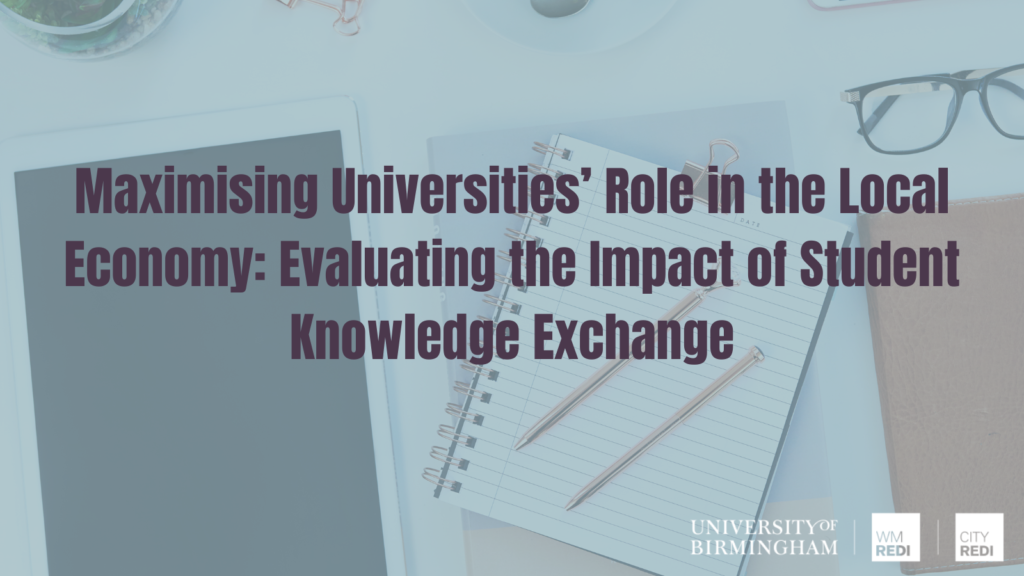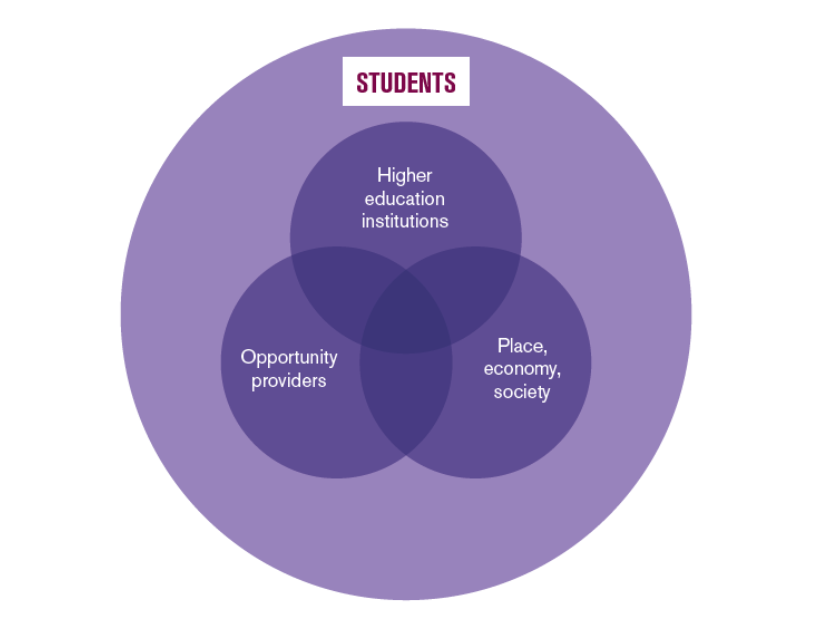
Johannes Read and Birindar Kaur Bahia evaluate the impact of the Student Knowledge Exchange Re-Imagined – Removing Barriers, Engaging Communities project, led by Keele University and the University of Birmingham.
Universities’ Role in Exchanging Knowledge in the Economy
Universities make a significant impact on the local and regional economy. Not only do university staff teach and support students to understand the current issues in their disciplines, but also students bring those ideas into their future jobs where they can be put into practice. This, in turn, supports businesses and the local and regional economy. WMREDI has undertaken extensive research into understanding the roles of universities in place and the economy. These four main groups (students, staff, businesses, and place) are termed a “quadruple helix” as shown in Figure 1.

Internships are one way in which knowledge and ideas are exchanged and make a difference to all four stakeholder groups. The University of Birmingham and Keele University led a project called “Student Knowledge Exchange Re-Imagined – Removing Barriers, Engaging Communities“, funded by the Office for Students and Research England, to improve the engagement of under-represented groups and the not-for-profit sector to remove barriers and engage communities in knowledge exchange.
In addition to developing and showcasing best practice and expertise in the delivery of knowledge exchange activity, the project also involved the development of an evaluative Student Knowledge Exchange Impact Tool to analyse the impact of student-led knowledge exchange.
In short, the flexible, supportive, virtual and online approach to internships and enterprise activity does remove barriers for underrepresented students to access high-quality internship and enterprise opportunities.

The findings outlined in this blog consider the qualitative and quantitative impacts for four stakeholder groups: students, higher education institutions, opportunity providers, and place. The data gathered from the project is analysed using the impact tool to answer the following research statements.
- Students: Evaluate how the project impacts students, in particular, those from widening participation backgrounds.
- Higher Education Institutions: There is importance in evidencing the impact role Higher Education Institutions are having on supporting knowledge exchange activities.
- Opportunity providers: Participating external organisations also gain from the knowledge exchange process. In particular, evidencing impacts and benefits for businesses, public bodies, charities, and social enterprises can be insightful.
- Place, economy, and society: The university acts as an anchor institution in a place. Evidencing and capturing how the university, students, and employers make a difference in the wider economy, society, and community is an important part of the impact of knowledge exchange.
The project was conducted alongside Keele University. Whilst there were differences in approaches, there are many similarities in the findings, which will be outlined in the next sections.
Evaluating Student Knowledge, Skills, and Confidence
To evaluate the impact of the internships themselves, students completed pre- and post-surveys to rate their changes in confidence and skills on a scale of 1 – 5. The comparisons were made between students who had either zero, one, or more than one under-represented characteristic.
In this project, under-represented characteristics were someone who was either: a mature student, from an area of low higher education participation (POLAR4 quintiles 1 or 2), from an ethnic minority, had a disability, were the first in the family to attend university, or were a parent.
The impact shows that, at the University of Birmingham, the change of skills was greatest for students with multiple under-represented characteristics (Figure 2).
Table 1 – Changes in skills for students at the University of Birmingham, by under-represented background.
| Average of Change in Skills | Not under-represented | One under-represented flag | More than 1 | Average of all students |
| Average of Presentation skills | 0.00 | 0.22 | 0.54 | 0.33 |
| Average of Networking skills | -0.11 | 0.50 | 0.67 | 0.47 |
| Average of Communication/ interpersonal skills | 0.00 | 0.22 | 0.33 | 0.24 |
| Average of Digital skills | 0.56 | 0.33 | 0.54 | 0.47 |
| Average of Problem solving | 0.33 | 0.22 | 0.25 | 0.25 |
| Average of Leadership | 0.00 | 0.11 | 0.33 | 0.20 |
| Average of Teamwork | 0.44 | 0.33 | 0.25 | 0.31 |
| Average of Motivation | 0.56 | 0.17 | 0.21 | 0.25 |
| Average of Negotiation | 0.22 | 0.39 | 0.50 | 0.41 |
| Average of Creativity/ innovation | 0.33 | 0.39 | 0.54 | 0.45 |
| Average of Planning/ organisation | 0.11 | 0.22 | 0.42 | 0.29 |
| Average of Resilience | 0.56 | 0.00 | 0.63 | 0.39 |
| Average of Average change in skills | 0.25 | 0.26 | 0.43 | 0.34 |
| T Test Not under-represented and one under-represented flag | 0.90 | Not statistically significant |
| T Test Not under-represented and more than one flag | 0.03 | Statistically significant |
| T Test One under-represented flag and more than one flag | 0.00 | Statistically significant |
Overall, and on average, all students improved their skills in all aspects. However, the greatest impacts were for students with multiple under-represented characteristics. For these students, Networking (+0.67), Resilience (+0.63), Creativity, Digital, and Presentation (all +0.54) increased significantly.
Similarly, the same pattern emerges when analysing by student background in Keele (Figure 3). Students from POLAR4 Quintile 1 (geographical areas with the lowest higher education participation rates) had a statistically greater improvement in their skills compared to students from the highest (POLAR4 quintile 5). The most significant improvements came from international students. These groups had a far higher improvement in their skills, far above any other group. This shows that their confidence has significantly improved whilst undertaking online virtual internships. Online internships can significantly support international students with their university experience.
Table 2 – Changes in skills for students at Keele University, by POLAR4 geographical background.
| Average Change in Skills | POLAR4 Quintile 1 | POLAR4 Quintile 2 | POLAR4 Quintile 3 | POLAR4 Quintile 4 | POLAR4 Quintile 5 | International Students | Average all students |
| Average of Average of Change in Skills | 0.32 | 0.06 | 0.12 | 0.20 | 0.06 | 0.76 | 0.19 |
| Average of Presentation skills | 0.00 | 0.08 | 0.15 | 0.27 | 0.10 | 0.71 | 0.16 |
| Average of Networking skills | 0.81 | 0.17 | 0.20 | 0.27 | -0.14 | 0.43 | 0.25 |
| Average of Communication/ interpersonal skills | 0.38 | -0.17 | -0.10 | 0.36 | -0.05 | 1.14 | 0.15 |
| Average of Digital skills | -0.38 | -0.17 | 0.10 | 0.27 | 0.24 | 0.71 | 0.08 |
| Average of Problem solving | 0.19 | 0.42 | 0.05 | 0.18 | 0.33 | 0.86 | 0.28 |
| Average of Leadership | 0.31 | 0.17 | -0.15 | 0.00 | 0.05 | 0.57 | 0.10 |
| Average of Teamwork | 0.31 | 0.08 | 0.05 | 0.09 | 0.05 | 1.00 | 0.18 |
| Average of Motivation | 0.50 | 0.25 | 0.00 | 0.36 | 0.10 | 0.71 | 0.25 |
| Average of Negotiation | 0.38 | -0.25 | 0.40 | 0.00 | 0.05 | 0.86 | 0.21 |
| Average of Creativity/Innovation | 0.38 | 0.17 | 0.20 | 0.27 | -0.10 | 0.71 | 0.21 |
| Average of Planning/Organisation | 0.38 | 0.17 | 0.05 | -0.09 | 0.10 | 0.71 | 0.17 |
| Average of Resilience | 0.56 | -0.25 | 0.45 | 0.36 | 0.00 | 0.71 | 0.28 |
| T Test POLAR4 Quintile 1 vs Average | 0.13 | Not statistically significant | ||
| T Test POLAR4 Quintile 1 vs POLAR4 Quintile 5 | 0.01 | Statistically significant | ||
| T Test International Students vs Average | 0.00 | Statistically significant | ||
The supportive, approachable, and hands-on approach of project staff ensured a greater representation of students, as well as the flexible approach of conducting short-term, flexible and online internships, supported these students to engage in knowledge exchange activity that would not have otherwise been the case. Feedback from students noted this impact as
- “The staff who supported were fantastic”
- “I cannot fault the support and communication”
- “I liked the flexibility of the hours and that it was part-time since I have to take care of my aunt and uncle”
Visit the Student Knowledge Exchange Impact Tool project page.
This blog was written by Hannes Read, Project Policy and Data Analyst, and Birindar Kaur Bahia, a Summer Inter at City-REDI / WMREDI, University of Birmingham.
Disclaimer:
The views expressed in this analysis post are those of the authors and not necessarily those of City-REDI or the University of Birmingham.
